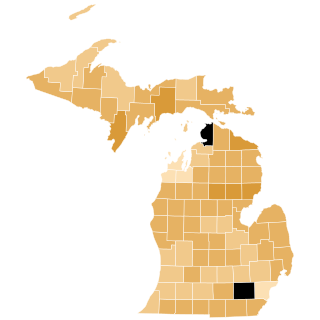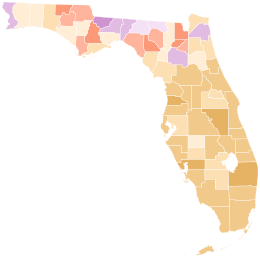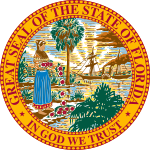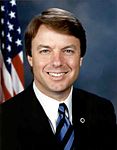
Each of the 50 U.S. states, the District of Columbia, and five territories of the United States holds either primary elections or caucuses to help nominate individual candidates for president of the United States. This process is designed to choose the candidates that will represent their political parties in the general election.
In American politics, a superdelegate is a delegate to a presidential nominating convention who is seated automatically.

Harold McEwen Ickes is the former White House Deputy Chief of Staff for President Bill Clinton. He was a leading figure in the Clinton administration's healthcare reform initiative.

The 2008 Democratic National Convention was a quadrennial presidential nominating convention of the Democratic Party where it adopted its national platform and officially nominated its candidates for president and vice president. The convention was held in Denver, Colorado, from August 25 to 28, 2008, at the Pepsi Center. Senator Barack Obama from Illinois gave his acceptance speech on August 28 at Invesco Field in what the party called an "Open Convention". Denver last hosted the Democratic National Convention in 1908. Obama became the party's first nonwhite nominee, and nominee of African descent, for president. Senator Joe Biden from Delaware was nominated for vice president.

From January 3 to June 3, 2008, voters of the Democratic Party chose their nominee for president in the 2008 United States presidential election. Senator Barack Obama of Illinois was selected as the nominee, becoming the first African American to secure the presidential nomination of any major political party in the United States. Due to a close race between Obama and Senator Hillary Clinton of New York, the contest remained competitive for longer than expected; neither candidate received enough pledged delegates from state primaries and caucuses to achieve a majority, without endorsements from unpledged delegates (superdelegates).

The 2008 Iowa Democratic presidential caucus occurred on January 3, and was the state caucuses of the Iowa Democratic Party. It was the first election for the Democrats of the 2008 presidential election. Also referred to as "the First in the Nation Caucus," it was the first election of the primary season on both the Democratic and Republican sides. Of the eight major Democratic presidential candidates, then-U.S. Senator Barack Obama of Illinois received the most votes and was ultimately declared the winner of the Iowa Democratic Caucus of 2008, making him the first African American to win the caucus and the first African American to win a primary state since Jesse Jackson in 1988. Former U.S. Senator John Edwards of North Carolina came in second place and then-U.S. Senator Hillary Clinton of New York finished third, though Clinton received more delegates than Edwards. Campaigning had begun as early as two years before the event.
The results of the 2008 Democratic Party presidential primaries are the detailed outcomes of a series of contests by which members of the United States Democratic Party chose their candidate for the 2008 U.S. presidential election. The contests are held in each of the fifty U.S. states, as well as the District of Columbia, Puerto Rico, American Samoa, Guam, the U.S. Virgin Islands, and Democrats Abroad. The Northern Mariana Islands was the lone U.S. state or territory which did not have a primary or caucus election in 2008. The outcomes include totals of delegates selected as well as popular votes.

The 2008 United States presidential election in Iowa took place on November 4, 2008, as part of the 2008 United States presidential election. Voters chose seven representatives, or electors to the Electoral College, who voted for president and vice president.

The 2008 Michigan Democratic presidential primary took place January 15, 2008. Originally, the state had 156 delegates up for grabs that were to be awarded in the following way: 83 delegates were to be awarded based on the winner in each of Michigan's 15 congressional districts while an additional 45 delegates were to be awarded to the statewide winner. Twenty-eight unpledged delegates, known as superdelegates, were initially able to cast their votes at the Democratic National Convention in Denver, Colorado.

The 2008 Nevada Democratic presidential caucuses took place on January 19, 2008 after having been moved from a later date by the Nevada Democratic Party. The Nevada Democratic Caucus was considered important in determining the eventual party nominee, as many described it as the "Bellwether of the West" seeing as how it is the first Western state to vote in the Democratic Presidential Primary season.

The 2008 Ohio Democratic presidential primary took place on March 4, 2008 and was open to anyone requesting a Democratic party ballot. In 2008, any registered Ohio voter could on election day request a primary ballot of either the Democratic or Republican party, by signing an affidavit stating that they supported the principles of the party whose ballot they are obtaining.

The 2008 Texas Democratic presidential primary and caucuses were a series of events to determine the delegates that the Texas Democratic Party sent to the 2008 Democratic National Convention. Delegates were selected using results from two sources: the Texas Presidential Primary held on March 4 by the Secretary of State of Texas's office, and a series of caucus events held between March 4 and June 7 by the Texas Democratic Party. The indecisive results of Super Tuesday, and the fact that Texas had the largest number of delegates among the states remaining on the Democratic primary calendar, resulted in the Texas primary receiving significant attention from both the Hillary Clinton and Barack Obama campaigns.

This is the electoral history of Barack Obama. Barack Obama served as the 44th president of the United States (2009–2017) and as a United States senator from Illinois (2005–2008).

"People United Means Action" was a political action committee in the United States that opposed the Democratic Party leadership and the nomination of Senator Barack Obama as the Democratic candidate for president in the 2008 presidential election. PUMA began as an effort by supporters of Obama's primary rival, Senator Hillary Rodham Clinton, who believed that Clinton should have been the Democratic nominee. According to PUMA, "We [were] protesting the 2008 Presidential election because we refuse to support a nominee who was selected by the leadership rather than elected by the voters."

The 2008 United States presidential election in South Carolina took place on November 4, 2008, and was part of the 2008 United States presidential election. Voters chose eight representatives, or electors to the Electoral College, who voted for president and vice president.

The 2016 Democratic National Convention was a presidential nominating convention, held at the Wells Fargo Center in Philadelphia, Pennsylvania, from July 25 to 28, 2016. The convention gathered delegates of the Democratic Party, the majority of them elected through a preceding series of primaries and caucuses, to nominate a candidate for president and vice president in the 2016 United States presidential election. Former U.S. Secretary of State Hillary Clinton was chosen as the party's nominee for president by a 54% majority of delegates present at the convention roll call securing it over primary rival Senator Bernie Sanders, who received 46% of votes from delegates, and becoming the first female candidate to be formally nominated for president by a major political party in the United States. Her running mate, Senator Tim Kaine from Virginia, was confirmed by delegates as the party's nominee for vice president by acclamation.

The 2008 United States presidential election in New Hampshire took place on November 4, 2008, as part of the 2008 United States presidential election throughout all 50 states and the District of Columbia. Voters chose four representatives, or electors to the Electoral College, who voted for president and vice president.

Presidential primaries and caucuses were organized by the Democratic Party to select the 4,051 delegates to the 2016 Democratic National Convention held July 25–28 and determine the nominee for President in the 2016 United States presidential election. The elections took place within all fifty U.S. states, the District of Columbia, five U.S. territories, and Democrats Abroad and occurred between February 1 and June 14, 2016. Between 2008 and 2020, this was the only Democratic Party primary in which the nominee had never been nor had ever become President of the United States. This was the first time the Democratic primary had nominated a woman for president.

The 2016 United States presidential election in Virginia was held on November 8, 2016, as part of the 2016 general election in which all 50 states plus the District of Columbia participated. Virginia voters chose electors to represent them in the Electoral College via a popular vote pitting the Republican nominee, businessman Donald Trump, and running mate Indiana Governor Mike Pence against Democratic nominee, former Secretary of State Hillary Clinton and her running mate, Virginia Senator Tim Kaine.





















